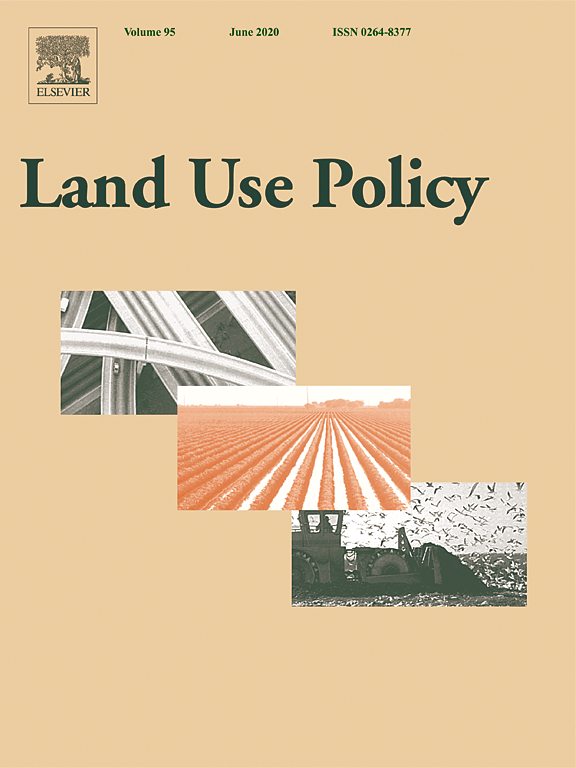Location
Land Use Policy is an international and interdisciplinary journal concerned with the social, economic, political, legal, physical and planning aspects of urban and rural land use. It provides a forum for the exchange of ideas and information from the diverse range of disciplines and interest groups which must be combined to formulate effective land use policies. The journal examines issues in geography, agriculture, forestry, irrigation, environmental conservation, housing, urban development and transport in both developed and developing countries through major refereed articles and shorter viewpoint pieces.
Land Use Policy aims to provide policy guidance to governments and planners and it is also a valuable teaching resource.
ISSN: 0264-8377
Members:
Resources
Displaying 6 - 10 of 279Towards a holistic land law evaluation in sub-Saharan Africa: A novel framework with an application to Rwanda’s organic land law 2005
Land laws provide a legal basis for addressing a country’s land-related strategies and are the central land policy instruments through which governments realise land policy objectives. Considering their vital role, it is imperative that land laws be evaluated to ensure that policy objectives are followed and that the laws are not ineffective or counterproductive. The extant literature, however, provides only a fragmentary basis for evaluation.
Towards a holistic land law evaluation in sub-Saharan Africa:
Land laws provide a legal basis for addressing a country’s land-related strategies and are the central land policy instruments through which governments realise land policy objectives. Considering their vital role, it is imperative that land laws be evaluated to ensure that policy objectives are followed and that the laws are not ineffective or counterproductive. The extant literature, however, provides only a fragmentary basis for evaluation.
Urban expansion and forest reserves: Drivers of change and persistence on the coast of São Paulo State (Brazil)
Landscapes changes are a result of a wide range of interactions between actors and driving forces (DFs). In this study, we quantify the contribution of different types of DFs to processes of land change in the Northern Coast of São Paulo State (NCSP), Brazil, an important region for tourism and the energy sector. We analysed the relationship between DFs and the processes of land change from 1985 to 2000 and from 2000 to 2015 with partial least squares path modelling.
Novel trends in SNS customers in food and beverage patronage: An empirical study of metropolitan cities in South Korea
Driven by the development of information and communications technology as well as the spread of social networking services (SNS), access to spatial information has changed the way people select sites or areas. This study determines whether new urban place selection—that is, the selection of places in a way that differs from the classic locational principle of land use—occurs via SNS by examining changes in the location of Food and Beverage(F&B) retail facilities patronized by citizens daily.
Developing farmer typologies to inform conservation outreach in agricultural landscapes
Understanding factors that motivate conservation behavior among farmers is crucial to addressing societal, soil, water, and wildlife conservation goals. Farmers employ soil conservation practices to maintain agricultural productivity while minimizing impacts to water and wildlife in the long-term. The majority of conservation programs are voluntary in nature and some farmers are more willing and/or able to implement conservation practices than others.




